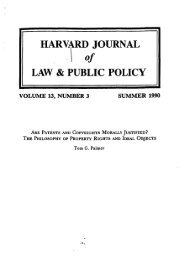G. A. Cohen on Self-Ownership, Property, and ... - Tom G. Palmer
G. A. Cohen on Self-Ownership, Property, and ... - Tom G. Palmer
G. A. Cohen on Self-Ownership, Property, and ... - Tom G. Palmer
Create successful ePaper yourself
Turn your PDF publications into a flip-book with our unique Google optimized e-Paper software.
226 Critical Review Vol. fa, No. 3sured when that egalitarian hypo thesis about ownership of externalresources is c<strong>on</strong>joined with the thesis of self-ownership.” <str<strong>on</strong>g>Cohen</str<strong>on</strong>g> c<strong>on</strong>cludesthat “equality had indeed been derived with no breach of therules of self-ownership” (ibid.), a result that, when c<strong>on</strong>joined withadditi<strong>on</strong>al arguments, “succeeded in exploding the libertarian posi-*ti<strong>on</strong>” (ibid., IS).The argumene<strong>on</strong>ce <strong>on</strong>e gets past <str<strong>on</strong>g>Cohen</str<strong>on</strong>g>’s strange assumpti<strong>on</strong>s-isingenious <strong>and</strong> has been extraordinarily influential. Wil Kymlicka(1990, II~), for example, asks, in his C<strong>on</strong>temporary Polirical Philosophy:An Introducti<strong>on</strong>, “What would happen if the world was [sic] jointlyowned, <strong>and</strong> hence not subject to unilateral privatizati<strong>on</strong>? There are avariety of possible outcomes, but in general they will negate the inegalitarianimplicati<strong>on</strong>s of self-ownership.”2 Kymlicka cites, withoutrehearsing his argument, <str<strong>on</strong>g>Cohen</str<strong>on</strong>g>’s authority in support of this str<strong>on</strong>gclaim. More recently, Justin Weinberg (1997, 324) has reproducedparts of <str<strong>on</strong>g>Cohen</str<strong>on</strong>g>’s argument in an article in Critical Review, c<strong>on</strong>cludingthat “<str<strong>on</strong>g>Cohen</str<strong>on</strong>g> shows that libertarianism cannot be defended in the waythat most libertarian philosophers want to defend it.”3The c<strong>on</strong>clusi<strong>on</strong> that <str<strong>on</strong>g>Cohen</str<strong>on</strong>g> reaches <strong>and</strong> that has been so iduentidis, however, based <strong>on</strong> errors in <str<strong>on</strong>g>Cohen</str<strong>on</strong>g>’s reas<strong>on</strong>ing. There are numeroussteps in the argument that may be open to objecti<strong>on</strong>, but evengranting all of his assumpti<strong>on</strong>s, the logic of the argument fails.I shall first outline <str<strong>on</strong>g>Cohen</str<strong>on</strong>g>’s aims <strong>and</strong> general procedure. Sec<strong>on</strong>d, Ishall identify two crucial moves in his influential argument. Third, Ishall show that the fvst move is insupportable. Fourth, I shall showthat the sec<strong>on</strong>d move is based <strong>on</strong> a c<strong>on</strong>fusi<strong>on</strong>. I examine <strong>on</strong>ly twosteps of <str<strong>on</strong>g>Cohen</str<strong>on</strong>g>’s argument, but they are vitally important to his c<strong>on</strong>clusi<strong>on</strong>s<strong>and</strong>, if they are wr<strong>on</strong>g, his polemic against property in <strong>on</strong>e’spers<strong>on</strong>, <strong>and</strong> against attempts to ground several property <strong>on</strong> this foundati<strong>on</strong>,is severely weakened.Finally, I will c<strong>on</strong>clude with some general remarks about wherethis leaves <str<strong>on</strong>g>Cohen</str<strong>on</strong>g> <strong>and</strong> the issue of property rights. <str<strong>on</strong>g>Cohen</str<strong>on</strong>g> asserts thatlibertarianism is unjustified if we grant his assumpti<strong>on</strong>-offered withoutany argument whatsoever-that communism is justified. I c<strong>on</strong>cludeby rebutting this strange positi<strong>on</strong>.Before turning directly to <str<strong>on</strong>g>Cohen</str<strong>on</strong>g>’s case, I should offer a justificati<strong>on</strong>for plunging the reader into an often complicated <strong>and</strong> technicalargument, so much so that few readers have bothered to read it carefully.<str<strong>on</strong>g>Cohen</str<strong>on</strong>g>’s mistakes, although fatal to his enterprise of undermininglibertarianism, are instructive. <str<strong>on</strong>g>Cohen</str<strong>on</strong>g> does not succeed in “ex-











